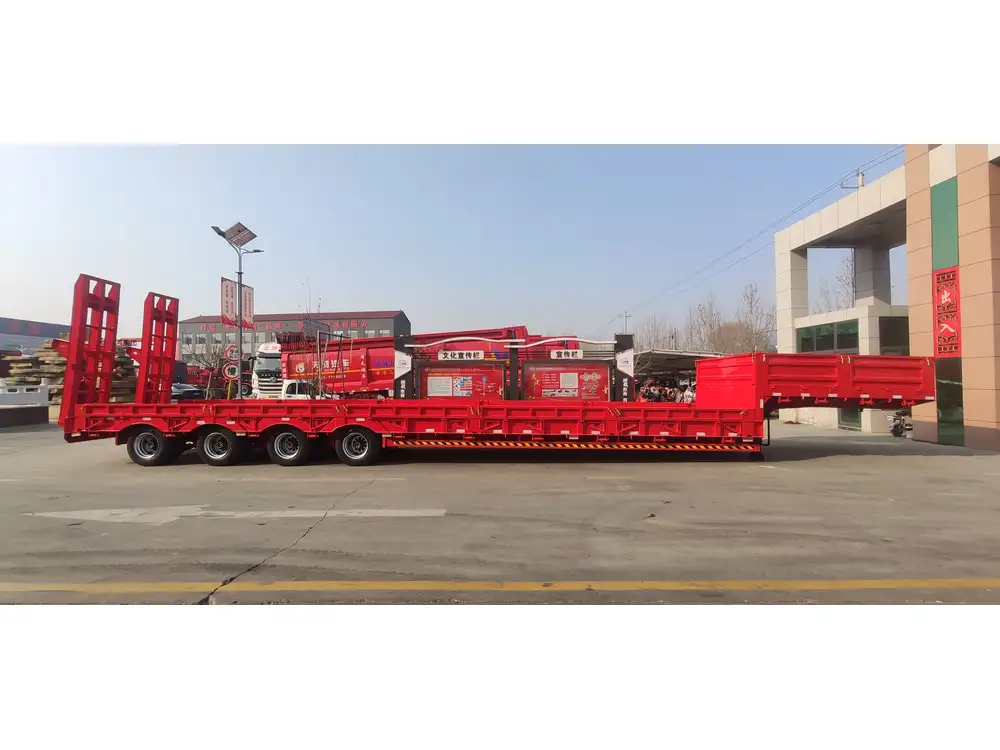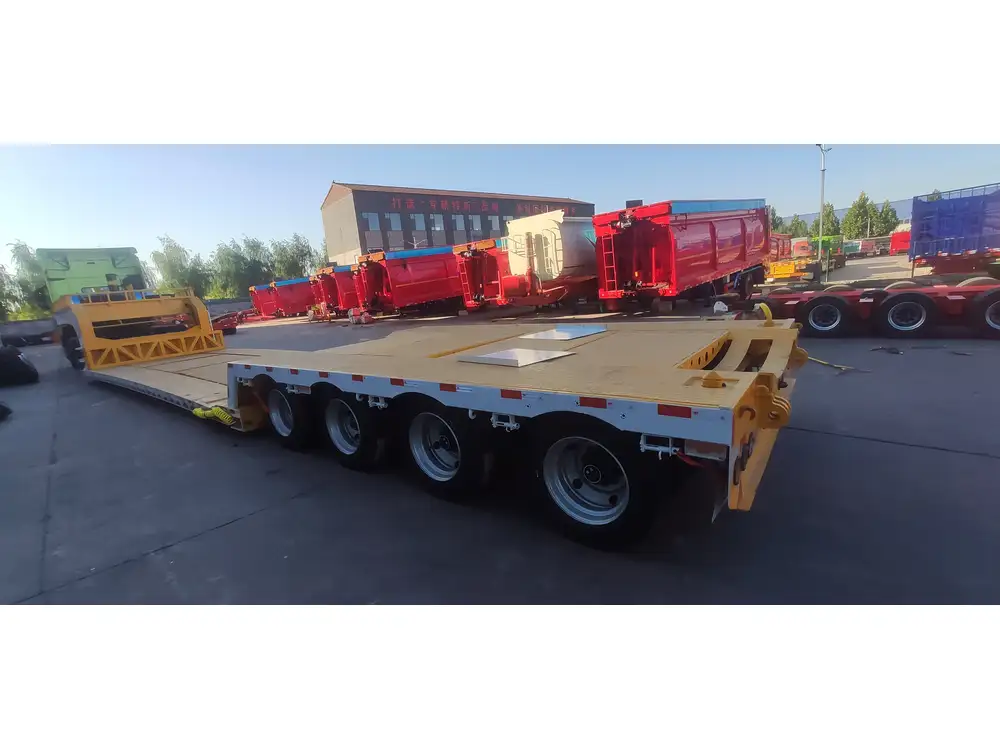Introduction
Dump trailers serve a pivotal role in the transportation industry, offering unmatched versatility for hauling and unloading materials. Transitioning a pickup bed trailer into a dump trailer presents a viable option for enthusiasts and professionals alike, providing a cost-effective solution without sacrificing quality. In this in-depth guide, we will explore the mechanics behind creating your own dump trailer from a pickup bed trailer, providing detailed insights on each step of the process.
Understanding the Components of a Dump Trailer
Before embarking on this transformation, it’s crucial to comprehend the parts involved in both dump trailers and pickup bed trailers. Here’s a comparative breakdown:
| Component | Pickup Bed Trailer | Dump Trailer |
|---|---|---|
| Chassis Frame | Standard rigid frame | Reinforced frame for strength |
| Axles | May be single or dual axles | Heavy-duty axles, often dual |
| Hydraulic System | Not present | Essential for lifting |
| Bed | Fixed in place | Tilting mechanism for dumping |
| Tires | Standard truck tires | Heavy-duty tires |

Materials Required for the Conversion
To successfully convert a pickup bed trailer into a dump trailer, gather the following materials:
- Manual or Electric Hydraulic Actuator: For lifting the trailer bed. Electric actuators offer easier installation.
- Steel Tubing or Angle Iron: For reinforcing the chassis.
- Plywood or Heavy-Duty Steel Plate: To construct the dump bed if replacing the existing one.
- Wiring Kit: For connecting the hydraulic system.
- Hinges and Brackets: To facilitate bed tilting.
- Heavy-Duty Tires: For increased load capacity.
- Safety Chains: For secure towing.
Step-by-Step Conversion Process
Step 1: Preparing the Pickup Bed Trailer
Inspection
Begin by conducting a thorough inspection of the pickup bed trailer. Ensure that the frame is structurally sound, with no signs of rust or damage. This will help prevent complications during the conversion process.
Dismantling the Bed
If the existing bed does not meet your utility needs, remove it carefully. Use a wrench to detach bolts and ensure the frame is clear of any obstructions.

Step 2: Reinforcing the Frame
Adding Structural Support
To accommodate the increased stress from a tipping mechanism, reinforce the trailer frame using steel tubing. Employ angle iron at critical points to fortify joints and connections. This step is crucial; a sturdy chassis is essential for a functional dump trailer.
| Reinforcement Area | Suggested Material |
|---|---|
| Main Frame | 2”x2” Steel Tubing |
| Cross Support Beams | 1”x1” Angle Iron |
| Hitch Joint | 3”x2” Steel Tubing |
Step 3: Constructing the Dump Bed
Design and Dimensions
Depending on your hauling needs, determine the dimensions of the new dump bed. A common width is between 6 to 8 feet, while lengths generally range from 8 to 12 feet.
Building the Bed
For a wooden bed, use heavy-duty plywood sealed for weather resistance. If metal is preferred, a heavy-duty steel plate is ideal for capacity and durability. Secure it firmly on the elevated steel frame using bolts that are rated for heavy loads.
Step 4: Installing the Hydraulic System
Selecting the Hydraulic Mechanism
Choose between a manual or electric hydraulic actuator. Electric systems, while slightly more expensive, provide more convenience and can be easily installed with minimal tools.
Installation
- Mounting the Actuator: Position the actuator near the trailer’s pivot point. This ensures optimal lifting power when dumping loads.
- Connecting to Power: For electric actuators, connect the wiring kit to the vehicle’s battery, ensuring safety with proper fuses.
- Test the System: Before finalizing everything, lift the bed to test the hydraulic system’s functionality. Ensure it folds smoothly and locks into position securely.

Step 5: Adding Tilt Mechanism and Safety Features
Hinge Installation
Using strong hinges, secure one end of the dump bed to the trailer frame. This allows the bed to tilt backward naturally when unloaded, providing ease of operation.
Incorporating Safety Chains
Affix safety chains rated for towing capacities. These should run from the bed to the trailer frame to secure the bed while traveling, minimizing the risk of accidents.
Step 6: Completing the Conversion
Finishing Touches
- Painting: With protective paint, coat all exposed surfaces to prevent rust and enhance longevity.
- Final Assembly Check: Ensure all components are tightened and secure. A thorough double-check ensures safety during use.
Documentation
It is wise to document all modifications. This will aid in future repairs or potential selling, providing necessary specifications to buyers.
Operational Considerations
Before utilizing your new dump trailer, keep the following operational tips in mind:
- Load Capacity Awareness: Always adhere to the specified load capacity to prevent accidents and structural damage.
- Regular Maintenance: Inspect hydraulic components, tires, and frame integrity frequently.
- Safe Loading Practices: Distribute weight evenly to maintain control while hauling and dumping.

Frequently Asked Questions
How much weight can a converted dump trailer hold?
The weight capacity will depend on the original pickup trailer’s specifications and the materials used for reinforcement. It is recommended to consult your trailer’s guidelines and ensure your modifications align with safe limits.
Can I add a cover to my dump trailer?
Absolutely! Adding a cover can protect your materials from the elements, enhancing their integrity. Ensure the cover does not interfere with the dumping mechanism.

What types of materials are best suited for a dump trailer?
Construction debris, mulch, sand, and yard waste are ideal loads. Always avoid toxic or hazardous materials unless specific guidelines are adhered to.
Conclusion
Transforming your pickup bed trailer into a dump trailer combines ingenuity and practicality, providing a cost-effective solution tailored to your hauling needs. By following this guide, you not only create a functional piece of equipment but also engage in a learning experience that enhances your skill set. The versatility of a dump trailer can significantly streamline various tasks, making it an invaluable addition to your operational toolkit.
By equipping yourself with the knowledge and skills to convert your pickup bed trailer, you’re not only saving money but also crafting a tool tailored to your specific requirements. Embrace the challenge, and enjoy the benefits of your customized dump trailer!



